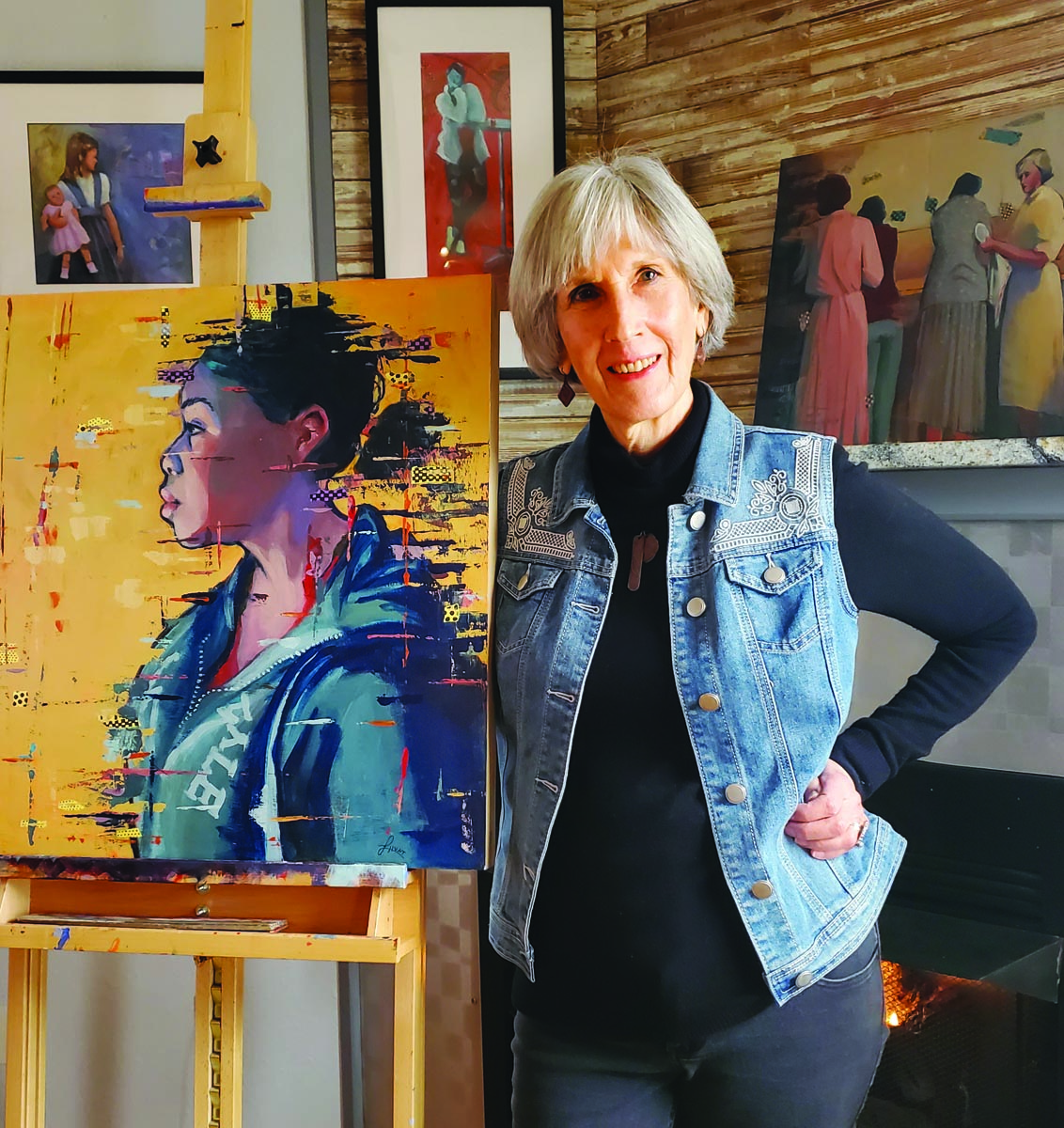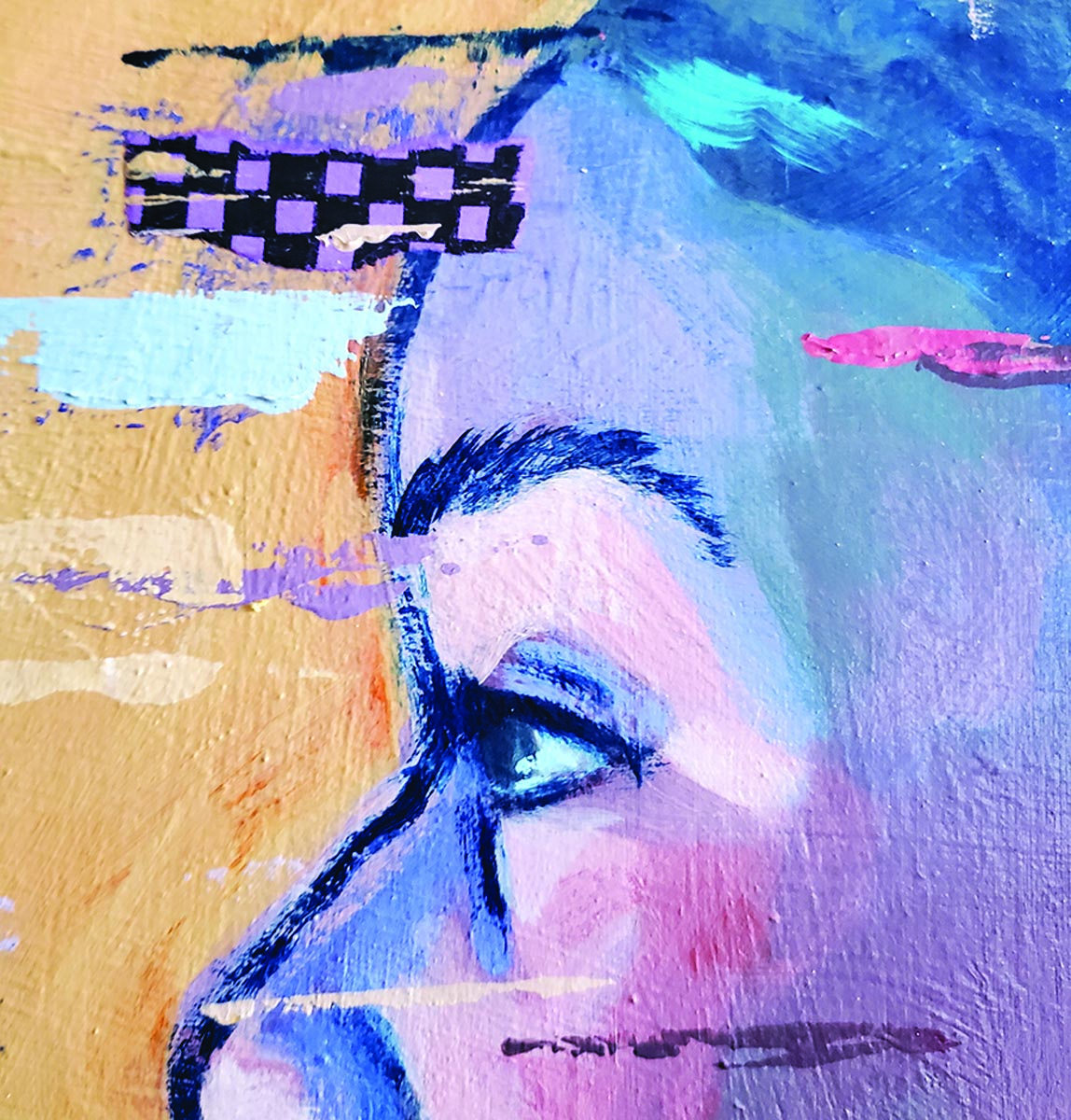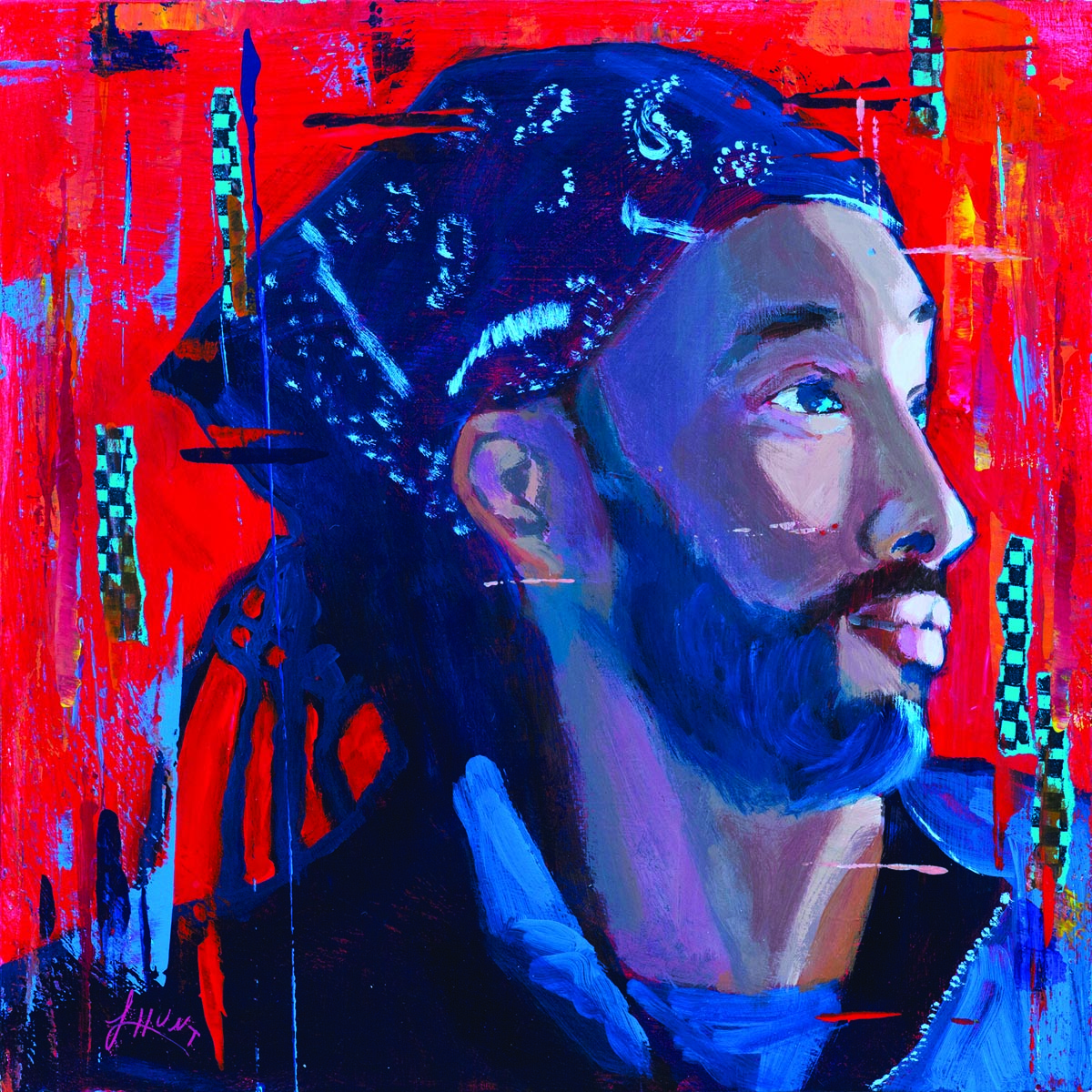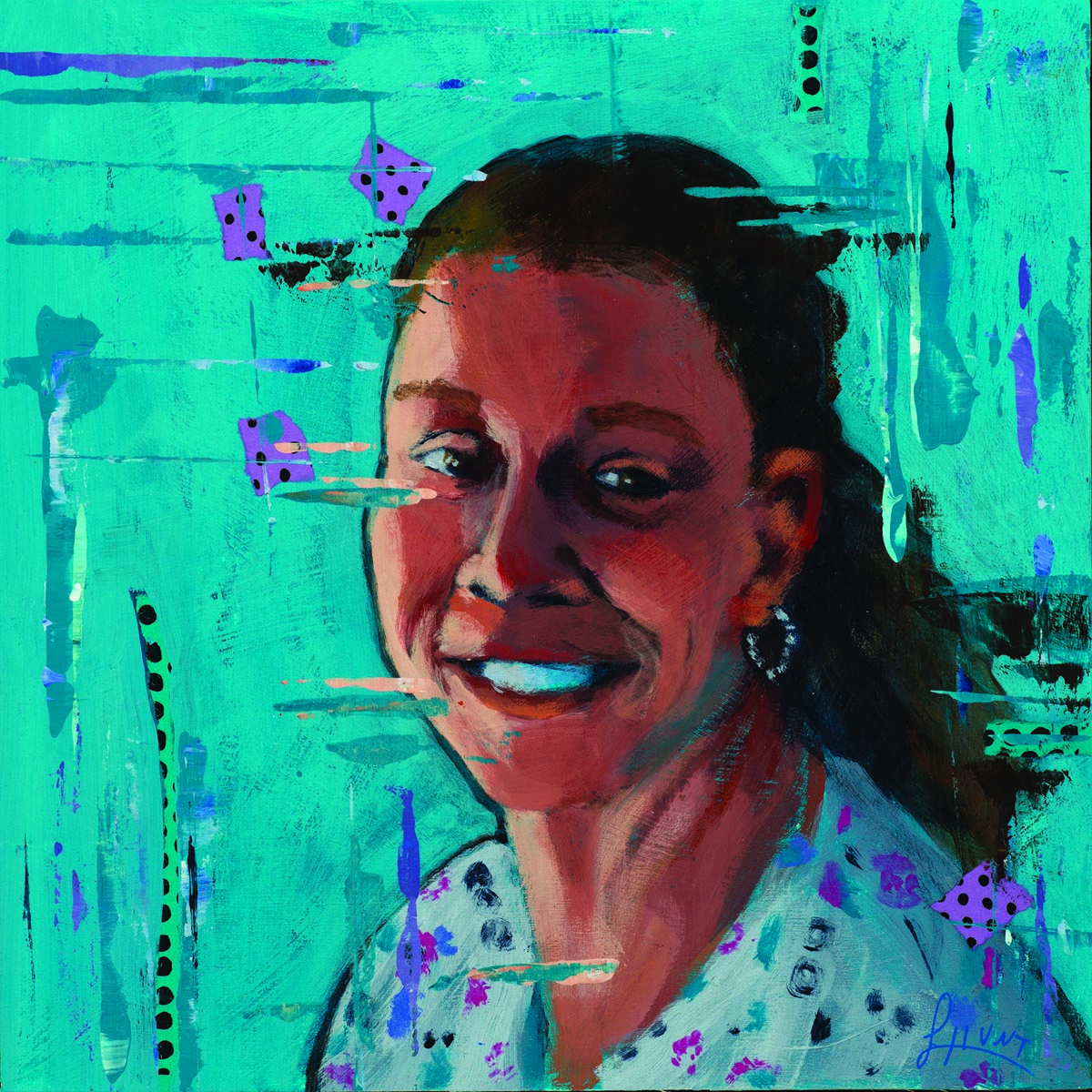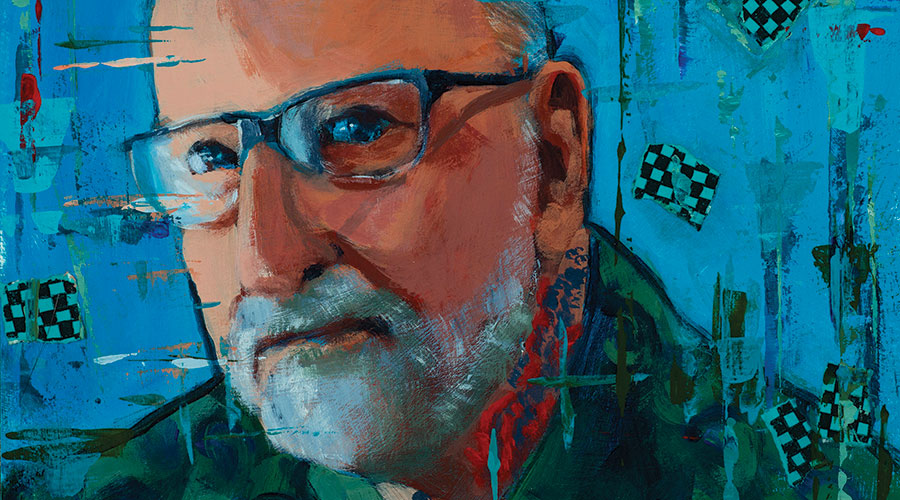
It’s Personal
By Babs Rodriguez
Photos by Meda Kessler
A segue into figurative painting allows former graphic artist Laura Hunt to follow her heart
Laura Hunt has long been attracted to shapes, forms, patterns and shadow play. She captures movement in a blur of acrylic paint, ensnaring a moment in time that hums with energy.
After a long career as the graphic artist/owner of her own marketing firm, Hunt has allowed herself in the last few years to follow her muse along a personal path. That journey, staggered by the pandemic, led to her first solo exhibition, opening this month. Not that there is anything solitary about the subject: “Our Community, Our Neighbors” is a show filled with other people’s auras.
Growing up on a farm outside Hamilton, Texas, Hunt cared for the family’s hens. When she moved on to study at Tarleton State University, she met and married a man with a desire to minister to a different sort of flock. The couple moved to Dubuque, Iowa, and Hunt commuted into Wisconsin to complete her English degree.
We are chatting in the cozy home studio built by the couple in 2005 (they made a pastoral move to Fort Worth in the ’80s). The gloom of the freezing day is lifted by the colorful canvases around us. We settle in next to Ginsburg the cat and ask when Hunt realized she was an artist. Steps away from a crackling fireplace, her first art memory ignites. She recalls discovering the “Draw Me!” ad in a copy of Progressive Farmer. “We didn’t have much to read, so I read every issue of that magazine.” She executed the drawing with care and submitted it with high hopes. “I didn’t get a scholarship, of course. But the salesman who contacted my parents must have done a really good job of convincing them I had some talent, because they purchased that course at the Art Instruction School in Minnesota. What it must have taken to inspire my thrifty, practical parents to pay for a correspondence course in commercial art — now, I realize how awesome that was.”
Mixed into the studio’s caches of intriguing art supplies and power tools are creations from different phases of artful exploration, from drawings on paper to found-object sculptures. Hunt has always fed her creativity, but it wasn’t until 2013 that she became a full-time painter, filling large canvases with colors and patterns sometimes hemmed by the silhouettes of blackbirds. Smaller works were equally meticulous. But soon, Hunt found herself creatively stuck. Her work was not connecting with her spirit. In 2018, she called Carol Ivey, a fellow artist and friend, for some direction. The advice was simple: Be more personal.
“That was when I allowed myself to begin putting figures, human forms, into my work,” Hunt says.
Portraying humans in her own graphic style means capturing the way they make her feel through a hyperfocus on the visual elements that capture her: the twist of a head, the shape of a face, a gesture in a slant of light. She began by creating digital images of vintage family photographs and manipulating contrast and lines into the images that inspired the subsequent painting. Scraps of paper and other collage elements add texture to the works, too. But something still eluded her.
“I am interested in community, communal causes, social justice,” she says. “I was looking for a way to bring that piece of my heart into my work.”
When George Floyd was murdered, Hunt felt moved to charge her artwork with purpose. She decided to paint a series of portraits of Black men and women killed by police. She painted their names into the works, and visitors to her website are encouraged to say those names out loud as they look into the faces. It is a moving experience, even when viewed digitally.
Searching for another way to purposefully connect her talent with a desire to help people, in 2019, Hunt took a plan to the Tarrant County Homeless Coalition. She proposed to paint 26 portraits in 52 weeks of men and women who had experienced homelessness, resulting in an exhibition and sale with all proceeds to benefit the nonprofit.
The first seven subjects were met through partner agencies of TCHC, but Hunt’s timeline was disrupted by the pandemic. In 2021, when Hunt could safely restart the project, Casa de Esperanza, a supportive housing community for the homeless and COVID-displaced, had become operational. Residents there became the final subjects for “Our Community, Our Neighbors.” Hunt’s time with each subject varied. She interviewed each person and took photos, but it was the artist’s goal to translate a human connection into the paintings. Everyone shared his or her favorite color, a reveal that Hunt honored by using that shade in the background. But it was the answer to another question that particularly moved her. “I noticed early on, how many responded in similar ways to my asking, ‘What is your gift?’ So many said their gift was a willingness to help others in any way possible.”
Excerpts from each interview are also displayed in the exhibit, capturing something of the voice of the person depicted. Each of the 26 men and women has been invited to attend the private opening reception, and all will receive an art print of their portrait. Hunt’s hope is that someone will buy the entire collection of original artworks and exhibit them somewhere that they will garner support for TCHC and draw more attention to the humanity of the homeless.
Painting these portraits made Hunt happy in a new way. “As I painted each person, I noticed how different each one was. I became increasingly mindful of how even the slightest difference makes each of us who we are. If someone, even one person, finds these portraits resonate with an individual’s story, then that will be meaningful to me.”
THE DETAILS
Our Community, Our Neighbors Working in collaboration with the Tarrant County Homeless Coalition, artist Laura Hunt painted contemporary portraits of 26 people who have experienced homelessness.
Exhibition Texas Wesleyan University’s Bernice Coulter Templeton Art Gallery,
1415 E. Vaughan St., Fort Worth, 817-531-4984. Feb. 17-April 23
Reception Ticketed guests are invited to enjoy refreshments at Black Coffee, located nearby. Reception tickets, $100. Feb. 17
To purchase tickets and for more information, visit the TCHC website. ahomewithhope.org/events/our-community-our-neighbor

